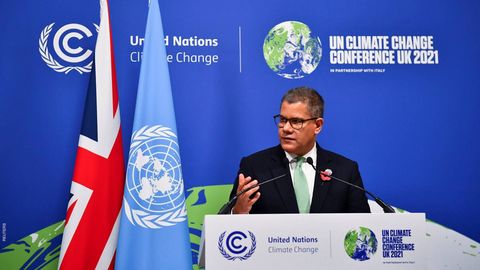Our vision on … • Analyses & Studies
Sharma appeals to nations’ “collective self-interest” to protect Glasgow goals

Last month, COP26 President Alok Sharma issued a statement urging government ministers to act together on the climate crisis or risk COP26 becoming “a bunch of meaningless promises.” Sharma emphasised these same themes of urgency and cooperation in a speech at Chatham House on Monday
Presenting tackling the climate crisis as “a space where national and global interests align”, Sharma said that now was the time to match the pledges made at last year’s COP26 summit with concrete action – or risk allowing the successes of the conference to “wither on the vine”.
It is now vital, Sharma said, for countries to come together in their “collective self-interest” to deliver on last year’s Glasgow Climate Pact – and ensure that it amounts to more than “just words on a page”.
The UK still holds the COP presidency and will continue to do so over most of the coming year until Egypt takes over ahead of November’s COP27 summit. In the meantime, Sharma said, the UK would strive for 2022 to be a year of “delivery.”
The government’s priorities
The most pressing item on Sharma’s agenda is ensuring that the world can “keep 1.5 alive” by making sure every country is committed to a net-zero target plan. Limiting global heating to an increase of 1.5°C – as agreed at 2015’s Paris Climate Conference – is vital to ensuring that humanity can mitigate the worst effects of climate change.
Sharma said that his personal priority in this regard was to target the G20 countries – a group collectively responsible for 80% of the world’s emissions.
Sharma also set out his aims to help countries cover the economic costs of tackling climate change. Under the terms of the Glasgow agreement, richer nations are supposed to be pledging $100bn of climate finance a year to developing countries to help them adapt. By the time of COP27, he said, countries would have to prove that this target was still within reach.
The economic advantages of net zero
As well as reiterating the stark effects of climate change on humanity, Sharma’s speech also framed adopting net-zero targets as a positive strategy for businesses. Quoting figures from Office for Budget Responsibility, Sharma said that unmitigated climate change could lead to public debt reaching a huge 289% of GDP before the century is out.
On the other hand, he said, taking action to achieve net zero emissions now could add 21% to GDP by the middle of the century.
“Clean is competitive,” Sharma said. “The train is pulling out of the station and countries and companies that want to remain competitive need to leap on now.”
Coal power: the beginning of the end?
Sharma also addressed the specific issue of coal-derived power. Controversy arose towards the end of COP26 when a last-minute intervention by India and China saw the initial agreement to “phase out” coal power revised to read “phase down” instead.
In his speech, Sharma attempted to defend the government’s record over this, saying it was remarkable that the issue had even made it into the text of the agreement in the first place.
“I was warned we would never get the word ‘coal’ in a COP text,” he said. “Yet every country at COP has agreed to phase-down coal power.”
Challenged on this in the Q&A session after his speech, Sharma insisted that coal power was falling out of favour with both governments and private companies.
“If you talk to the private sector, they are really reluctant to invest in coal,” he said, because investors could “see that they’re going to end up with potentially stranded assets.”
He also said that developments around coal power needed to be viewed within the context of “what happens over a period of time” and changing international developments – including, importantly, the effects of the United States recommitting to the Paris Agreement.
Overall, Sharma said, increased international focus on climate change had created “a collective self-interest, powerful enough to deliver consensus in a fractured world.”
Sharma seems confident that this collective sense of duty will be enough to deliver positive change this year – but the world will have to wait until the COP27 summit in Sharm el-Sheikh to see just how effective it is.